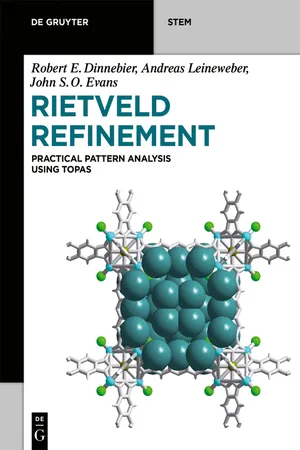
eBook - ePub
Rietveld Refinement
Practical Powder Diffraction Pattern Analysis using TOPAS
- 347 pages
- English
- ePUB (mobile friendly)
- Available on iOS & Android
eBook - ePub
Rietveld Refinement
Practical Powder Diffraction Pattern Analysis using TOPAS
About this book
Almost 50 years have passed since the famous papers of Hugo Rietveld from the late sixties where he describes a method for the refinement of crystal structures from neutron powder diffraction data. Soon after, the potential of the method for laboratory X-ray powder diffraction was discovered. Although the method is now widely accepted, there are still many pitfalls in the theoretical understanding and in practical daily use.
This book closes the gap with a theoretical introduction for each chapter followed by a practical approach. The flexible macro type language of the Topas Rietveld software can be considered as the defacto standard.
Tools to learn more effectively

Saving Books

Keyword Search

Annotating Text

Listen to it instead
Information
1The powder diffraction method
Powder diffraction is one of the most powerful techniques for studying the atomic structure of real materials. In this chapter we assume the reader has a knowledge of basic crystallography and refer them to one of the excellent texts on the topic for more advanced information (e.g., Giacovazzo et al., 2011; Egami & Billinge, 2012). We will restrict ourselves to giving sufficient information that we can discuss diffraction phenomena that are particularly important for powder diffraction. We describe the basic effects of diffraction by crystalline and noncrystalline samples. We also discuss the origins of peak broadening in powder diffraction patterns and quantify how peak overlap leads to information loss relative to single crystal experiments. We refer readers to specialist texts (e.g., Pecharsky & Zavalij, 2009; Dinnebier & Billinge, 2008) for detailed information on experimental aspects of powder diffraction.
1.1Diffraction by crystallites
When radiation with a wavelength comparable to interatomic distances is incident on a crystallite, two types of coherent elastic scatterin...
Table of contents
- Cover
- Title Page
- Copyright
- Preface
- Contents
- 1 The powder diffraction method
- 2 The Rietveld method
- 3 Structure independent fitting
- 4 Peak shapes: Instrument ∘ microstructure
- 5 Quantitative phase analysis
- 6 Restraints, constraints and rigid bodies
- 7 Solving crystal structures using the Rietveld method
- 8 Symmetry mode refinements
- 9 Magnetic refinements
- 10 Stacking disorder
- 11 Total scattering methods
- 12 Multiple data sets
- 13 Appendix: Mathematical basics
- Index
Frequently asked questions
Yes, you can cancel anytime from the Subscription tab in your account settings on the Perlego website. Your subscription will stay active until the end of your current billing period. Learn how to cancel your subscription
No, books cannot be downloaded as external files, such as PDFs, for use outside of Perlego. However, you can download books within the Perlego app for offline reading on mobile or tablet. Learn how to download books offline
Perlego offers two plans: Essential and Complete
- Essential is ideal for learners and professionals who enjoy exploring a wide range of subjects. Access the Essential Library with 800,000+ trusted titles and best-sellers across business, personal growth, and the humanities. Includes unlimited reading time and Standard Read Aloud voice.
- Complete: Perfect for advanced learners and researchers needing full, unrestricted access. Unlock 1.4M+ books across hundreds of subjects, including academic and specialized titles. The Complete Plan also includes advanced features like Premium Read Aloud and Research Assistant.
We are an online textbook subscription service, where you can get access to an entire online library for less than the price of a single book per month. With over 1 million books across 990+ topics, we’ve got you covered! Learn about our mission
Look out for the read-aloud symbol on your next book to see if you can listen to it. The read-aloud tool reads text aloud for you, highlighting the text as it is being read. You can pause it, speed it up and slow it down. Learn more about Read Aloud
Yes! You can use the Perlego app on both iOS and Android devices to read anytime, anywhere — even offline. Perfect for commutes or when you’re on the go.
Please note we cannot support devices running on iOS 13 and Android 7 or earlier. Learn more about using the app
Please note we cannot support devices running on iOS 13 and Android 7 or earlier. Learn more about using the app
Yes, you can access Rietveld Refinement by Robert E. Dinnebier,Andreas Leineweber,John S.O. Evans in PDF and/or ePUB format, as well as other popular books in Physical Sciences & Geology & Earth Sciences. We have over one million books available in our catalogue for you to explore.